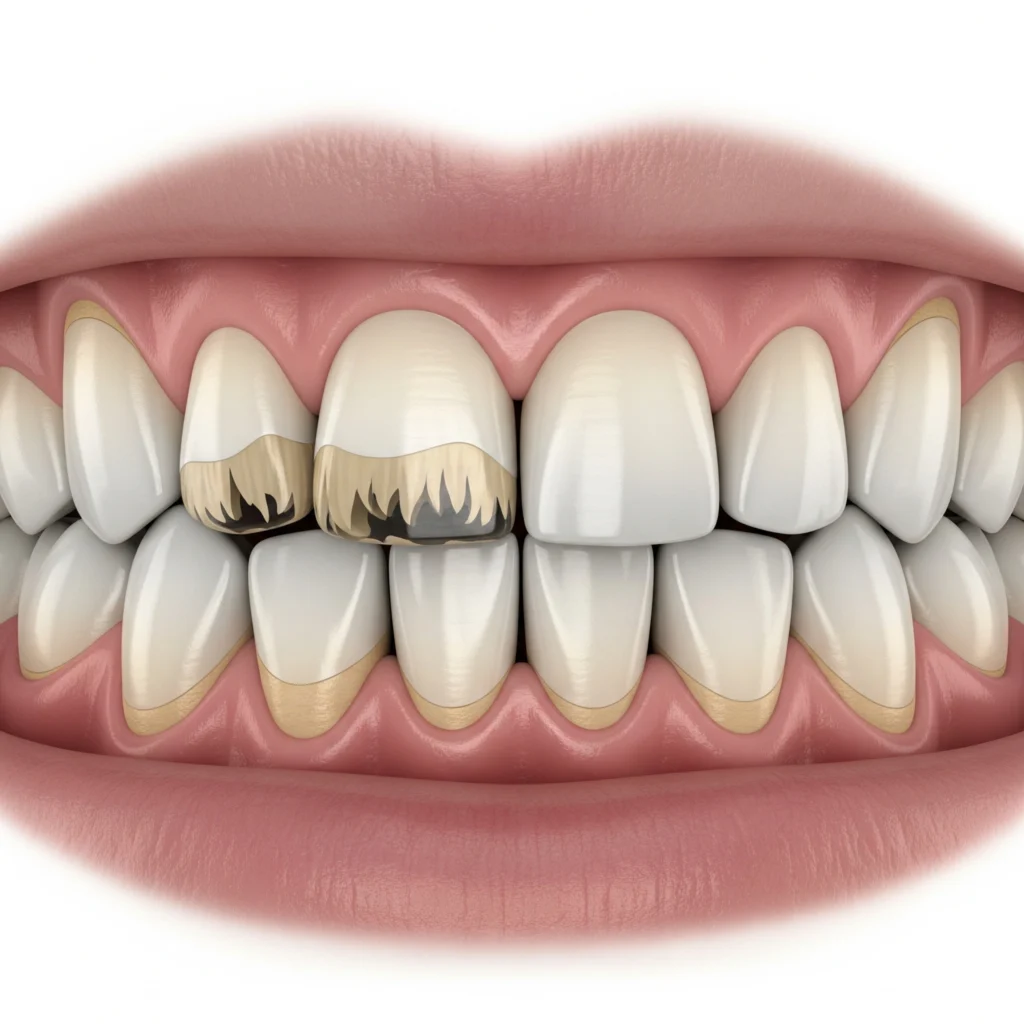Tooth attrition refers to the gradual loss of tooth structure due to prolonged tooth-to-tooth contact, often seen in individuals who grind or clench their teeth. This wear is mechanical in nature, commonly associated with a condition known as bruxism. When left unaddressed, tooth attrition can compromise not only the function of your teeth but also your overall oral health.
Thankfully, early recognition and professional guidance can help prevent further damage and restore your smile’s strength and integrity.
The leading cause of tooth attrition is unconscious teeth grinding, whether it happens during the day or while sleeping. However, it’s not the only factor responsible. Several other elements may contribute to enamel wear:
Even though attrition tends to develop slowly, it may go unnoticed until noticeable changes occur. That’s why regular dental visits and being aware are so important.

Though tooth attrition is a form of enamel loss, it’s distinct from conditions like abrasion and erosion:
Understanding these differences helps in accurate diagnosis and treatment planning.
Timely identification of tooth attrition symptoms is essential. The condition often starts without pain but becomes more noticeable as damage advances.
Common Signs Include:
Noticing even one of these signs should prompt a dental evaluation. Early intervention can prevent more serious complications.
Thankfully, treating tooth attrition is fully achievable with personalized dental care. Treatment aims to stop further wear, correct underlying issues, and restore aesthetics.
1. Stress Control and Habit Change
Practicing relaxation techniques, cognitive therapy, or physical activity can help manage stress—thereby reducing clenching or grinding behavior.
2. Use of Night Guards
Custom-made night guards act as a cushion between the upper and lower teeth, significantly reducing enamel wear during sleep.
3. Restorative Dental Work
When structural damage is visible, procedures like bonding, veneers, or crowns can rebuild tooth anatomy and prevent further harm.
4. Bite Correction
Orthodontic treatment with braces or aligners is often recommended if misalignment is a contributing factor.
5. Professional Monitoring
Routine checkups help track the condition and adjust treatment plans when needed, ensuring long-term success.
It’s always better to prevent enamel loss than to restore it later. Making conscious changes in daily habits can significantly lower the risk of tooth attrition.
Simple Yet Effective Preventive Tips:
These proactive strategies are easy to follow and highly beneficial in preserving your natural enamel.
Ignoring the early indicators of tooth attrition can eventually result in severe consequences. As the enamel continues to erode, the inner dentin layer gets exposed, making teeth vulnerable to:
Early action helps prevent complex and expensive dental procedures later. Fortunately, with modern dentistry, most issues can be managed successfully when caught in time.
Do you notice any symptoms of tooth attrition in your mouth? Don’t wait for discomfort to increase. With the right care, you can protect your teeth, regain comfort, and enhance your confidence.
Unidental provides comprehensive evaluation and personalized treatments for tooth wear, all performed by experienced dental professionals in a patient-friendly setting.
Book your appointment at Unidental today and take control of your oral health—your smile deserves it!
Tooth attrition might not cause immediate pain, but its long-term impact can be quite serious. The good news is that it’s treatable and mostly preventable. With the right awareness, a few lifestyle adjustments, and timely dental care, you can keep your natural teeth strong and functional well into the future.
Stay proactive—because every tooth plays a vital role in your health and happiness.
Yes, once enamel is lost, it doesn’t regenerate.However, dental procedures can rebuild both function and shape.ever, dental treatments can restore form and function.
Wearing a night guard, managing stress, and visiting your dentist regularly are the best preventive steps.
Absolutely. Even teenagers can develop tooth wear from habits like grinding or poor bite alignment.
Attrition typically develops gradually. Depending on the severity of grinding and other habits, significant wear can occur in just a few years.
It varies by plan. Many insurance policies cover restorative and preventive procedures, especially if the condition is affecting function.
Hyderabad : +91 6305 971445
Anantapur: +91 70758 90089
Goa: +91 83266 32500
Mon to Sat 10:00AM to 8:00PM
Sun 10:00AM to 12:00PM

Our goal is to provide friendly, caring dentistry with the highest standards in general, cosmetic, and specialist treatments. We strive to be the best dental hospital for comprehensive oral care.
We use advanced dental technology to deliver safe, precise, and painless treatments for every patient.